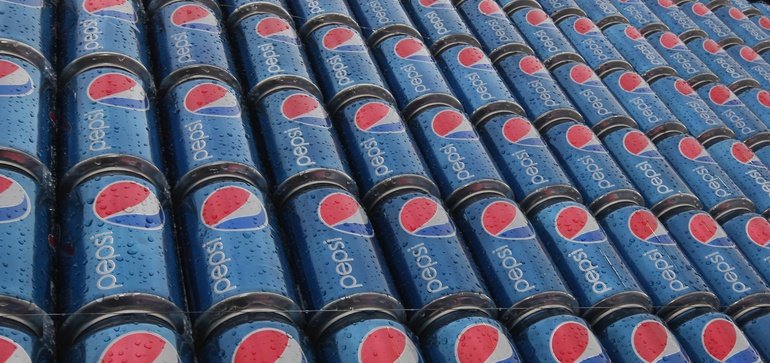PepsiCo says it’s grabbing market share from Coca-Cola, smaller players

Dive Brief:
- PepsiCo is gaining market share from Coca-Cola and upstart competitors as the CPG sees strong demand for classic brands like Pepsi and Tropicana and new offerings such as Mtn Dew Rise Energy, company CFO Hugh Johnston told CNBC.
- PepsiCo, which reported earnings on Tuesday, said its PepsiCo Beverages North America unit posted revenue growth during the second quarter of 21%. “If you look at it from a category perspective, most of the categories that we’re in, our market shares are going up,” he told the business network.
- Johnston said PepsiCo, which has been rolling out new beverage offerings, is seeing a payoff from its innovation during the pandemic and the fact that consumers are increasing visits to restaurants, bars and other establishments following COVID-19.
Dive Insight:
PepsiCo reported a robust quarter as demand for its beverages outside the home returned. The company posted revenue of $19.22 billion, far outpacing analysts who forecast sales of nearly $18 billion during the three-month period. The quarter and favorable trends for the remainder of its fiscal 2021 year prompted PepsiCo to predict an 11% growth in constant currency earnings per share, an increase from its prior forecast of high-single-digit growth.
The company’s North American beverage business, the largest of its divisions, posted organic revenue growth of 21%. Volume for beverages like Tropicana orange juice, Aquafina water and its namesake cola surged 15%. During this same quarter a year ago, organic revenue in the division had fallen 7% as many places were shuttered because of the pandemic.
PepsiCo, however, moved forward with new product offerings and innovations despite the downturn.They show signs of paying off. In the last few months, PepsiCo has introduced a line of energy drinks called Mtn Dew Rise Energy targeted for morning consumers — which Johnston said is “beating our expectations” — a functional sparkling water drink in Soulboost and new lines of premium, nonalcoholic cocktail mixers.
CEO Ramon Laguarta told analysts that smaller, medium-sized brands like Starbucks, Pure Leaf and Bubly, among other products, are “growing at a very nice pace.”
PepsiCo made a big splash in energy drinks with the $3.85 billion purchase of Rockstar in March 2020. Laguarta said the company’s execution is improving and it’s gaining distribution but that turning around the brand remains a “multiyear effort.”
PepsiCo’s Frito-Lay North America operations, which oversees brands like Fritos, Doritos and Sun Chips, was aided by higher traffic in the convenience store and foodservice channels as consumers ventured out more, with organic revenue growth up 6%. Growth in the same period a year ago also was 6%.
Its Quaker Foods North America business was the only segment to report a drop, with organic revenue falling 14%. Product volume dropped 21%. The division was among the bigger beneficiaries last year as consumers spent more time at home, fueling demand for its oatmeal and maple syrup. This had marked a reversal of fortunes for a division that was struggling before the pandemic. Despite the decline, PepsiCo said organic revenue for the segment is up about 9% from two years ago.
PepsiCo’s strategy in beverages contrasts with its archrival in Atlanta.
Coca-Cola used the pandemic to end production of many brands in its beverage portfolio to focus on drinks that are growing and have the potential to achieve a large scale. It shuttered production of the iconic Tab drink, sold Zico coconut water and recently announced it would discontinue sales of Coca-Cola Energy in the U.S. Coca-Cola has said it plans to eliminate an estimated 200 brands globally.
Still, Coca-Cola, which reports earnings on July 21, is likely to benefit from the same upswing in demand for beverages outside the home that helped PepsiCo during its recent quarter.
Even as it has been culling brands, Coca-Cola has been innovating, including the reformulation of Coca-Cola Zero Sugar to taste more like Coke, and partnering with Molson Coors last year to introduce Topo Chico Hard Seltzer. Coca-Cola operates in many of the same beverage categories as PepsiCo, like juice, tea, water, sports drinks and soda, so perhaps pruning its business will allow it to focus more attention on clawing back share in these categories.
PepsiCo said Tuesday it plans to implement price increases, likely after Labor Day, joining other companies who have made similar announcements. Coca-Cola, Conagra Brands, Unilever, Nestlé, Mondelēz International and General Mills are just a few of the companies whose executives have announced price increases to offset higher costs for shipping, raw materials and other expenses.
Source: fooddive.com

